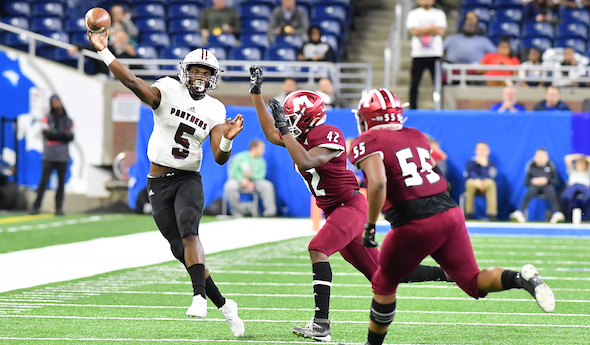
River Rouge Ends 2019 with Stunning Finish
November 30, 2019
By Tom Kendra
Special for Second Half
DETROIT – River Rouge wasn’t intimidated by Muskegon’s national acclaim or 859 football victories, the most by any Michigan high school.
If anything, the chance to knock off the unbeaten and top-ranked Big Reds brought out the absolute best in the Panthers.
After spotting Muskegon a 7-0 lead, Rouge scored the final 30 points to claim a 30-7 victory in the Division 3 championship game Saturday night at Ford Field.
“We are known for basketball, but now we have a football title,” said 10th-year Rouge coach Corey Parker, who lauded his team for playing fearlessly on both sides of the ball. “Now we have a football title, and 20 years from now these guys are going to be talking about it.”
All the talk coming into the game centered on Muskegon senior quarterback Cameron Martinez, the two-time MLive Player of the Year who had rushed for more than 2,000 yards. But the talk afterward was about a different QB – River Rouge’s Mareyohn Hrabowski.
Hrabowski, a 6-foot-3, 205-pound junior, answered an early score by Martinez with three rushing touchdowns of his own, finishing with 15 carries for 175 yards – an average of nearly 12 yards per carry. He also completed 6-of-12 passes for 45 yards.
“I just had to follow my blocks,” said Hrabowski. “I had faith in myself and my team, and we came out on top.”
It was the first Finals appearance and championship for Rouge, which has qualified for the playoffs all 10 years under Parker. Rouge lost its opener this fall to Friday’s Division 4 champion Grand Rapids Catholic Central before reeling off 13 straight wins. The Panthers were ranked No. 5 in Division 3 entering the playoffs
The other storyline Saturday was the Rouge defense, which held a Muskegon team averaging 49 points per game to a season-low seven.
The Panthers did it with an ultra-aggressive strategy, sometimes with all 11 defensive players within three yards of the line of scrimmage just daring Martinez to throw the ball.
Instead, Muskegon kept trying to find a way to break Martinez through the initial wall and into the clear, but it never happened.
Martinez, a 5-11, 190-pound senior who has committed to Ohio State, finished with 108 rushing yards, but it took him 34 carries to get there – at 3.2 yards per carry. He also did not complete a single pass, going 0-for-5 through the air.
“We just didn’t play our game, really,” said Martinez, who faced relentless pressure every time he dropped back to throw. “We have played great for 13 weeks, and we picked a bad time to play bad.”
Hrabowski scored on runs of one and 40 yards in the second quarter, as the Panthers took a 14-7 lead into halftime.
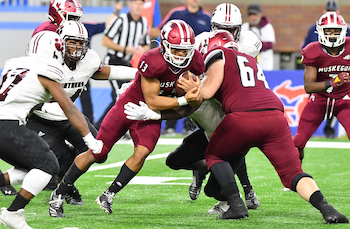 Rouge (13-1) kept its foot on the accelerator during the second half, with Rmontaye Caldwell returning the third-quarter kickoff 36 yards to the Muskegon 35-yard line. On the next play, Hrabowski went 35 yards on a keeper and the lead was 21-7.
Rouge (13-1) kept its foot on the accelerator during the second half, with Rmontaye Caldwell returning the third-quarter kickoff 36 yards to the Muskegon 35-yard line. On the next play, Hrabowski went 35 yards on a keeper and the lead was 21-7.
The score remained the same until the fourth quarter, when Rouge rounded out the scoring on a 31-yard field goal by Avery Burch and a 33-yard run by Deandre Bulley.
Bulley, a 6-2, 245-pound senior who is being heavily recruited by schools at the Division I level, came into the game needing just 80 yards to reach 2,000 for the season. He came up five yards short, with 15 carries for 75 yards, but Hrabowski more than made up the difference.
Rouge used extremely wide splits on the offensive line to open up running lanes for Hrabowski, who stunned the stingy Big Reds’ defense with his vision and deceptive speed in the open field. On two of his scoring runs he faked a jet sweep handoff and ran straight ahead behind guard Deshawn Smith and tackle Chance Moore through the left side of the line and eventually into the end zone.
The final stats bear out Rouge’s dominance.
The Panthers held a 330-180 edge in total yards, including a 45-0 edge passing. Rouge outrushed Muskegon 285-180.
Darieon Jones, a 5-8, 190-pound senior defensive back, was everywhere for Rouge, registering a game-high 14 tackles, including 10 solos. Linebacker Deshawn Walker had eight tackles, and Tyron Jones and Chastin Cross each made six stops.
River Rouge has been known around the state as a basketball school, winning 12 Class B state titles under legendary coach Lofton Greene during the 1960s and 1970s. But now the Panthers, who are part of the Michigan Metro Athletic Conference, are making a name for themselves on the gridiron.
Rouge made a statement by dominating Orchard Lake St. Mary’s 49-14 in the Regional Final, then overcame a 7-0 fourth-quarter deficit in last week’s Semifinal to knock off Chelsea 14-7.
The Panthers rode that momentum into the Final.
Muskegon, led by senior linebacker Tarran Walker and senior safety Tyreese Oakes with nine tackles apiece, added another layer of frustration to its Ford Field troubles.
The Big Reds have played in a championship game at Ford Field seven of the last eight years. But the lone victory, and the lone Finals title for 10th-year head coach Shane Fairfield, came with a 28-10 victory over Farmington Hills Harrison in 2017 for the Division 3 championship.
“That’s the way it happens,” said Fairfield, who last week became the second-winningest coach in Muskegon High School history. “We won 13 games and made 13 other teams feel this way. This is the risk you take. You could lose early or not even make the playoffs and never experience this.”
Muskegon, which had won 40 of its past 41 games entering Saturday night, is the winningest program in state history with 859 victories, a total which also ranks seventh nationally.
PHOTOS: (Top) River Rouge quarterback Mareyohn Hrabowski rolls out and finds a receiver as Muskegon’s Billy Johnson Jr. (42) and Dwight McKinney close in. (Middle) River Rouge defenders including Rmontaye Caldwell (17) surround Big Reds quarterback Cameron Martinez.
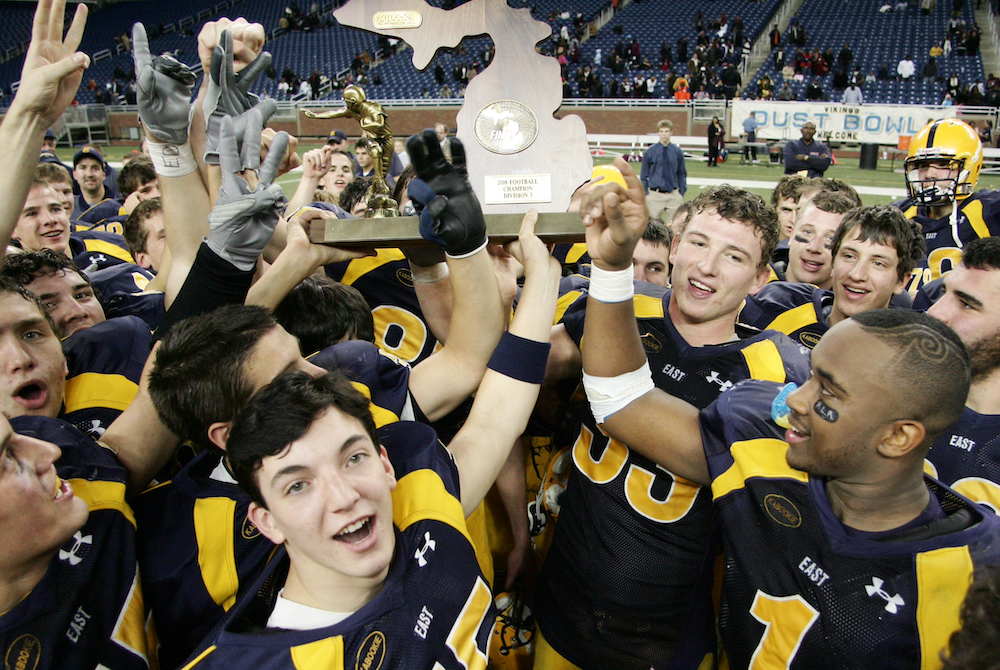
EGR 5-Year Title Run Remains Awe-Inspiring, Product of More Than Talent Alone
By
Steve Vedder
Special for MHSAA.com
November 25, 2022
It was Peter Stuursma's first year at East Grand Rapids and while the wolves weren't necessarily knocking at the door, they were definitely on the prowl.
The tradition-rich Pioneers football team had slumped to an uncharacteristic 3-6 record in Stuursma's first season as varsity head coach in 2000, and there were subtle signs a community used to winning was growing restless with the program's direction.
That's when Stuursma bumped into one of his players coming out of the weight room, and the two had a quick conversation which he clearly remembers 22 years later.
"It was this senior offensive lineman and all he said was, 'Don't worry about it Coach, it's not going to happen again. We got this,’" Stuursma said. "We had just gone 3-6, and I'm wondering how we're going to get this going and that they might get rid of me. You never underestimate what people can do."
East Grand Rapids, under legendary coach George Barcheski, had been the dominant football program in West Michigan with 28 winning seasons over 29 from 1970-99, and 38 victories in 39 games from 1993-95, along with Class B championships in 1976 and 1983. After Stuursma replaced the retiring Barcheski,, some in the community were expecting more of the same when it came to success.
Those fans never dreamed what they would see as the Pioneers promptly pieced together arguably the greatest decade-long stretch in Michigan high school football history – and without doubt one of the most incredible five-year runs of dominance.
Even that optimistic offensive lineman couldn't have imagined a remarkable 126-7 record over the next 11 years, a 40-3 MHSAA Tournament mark and seven Finals championships. Five of those titles (2006-10) came in a row, a feat accomplished just three times in the now 46-year history of the playoffs.
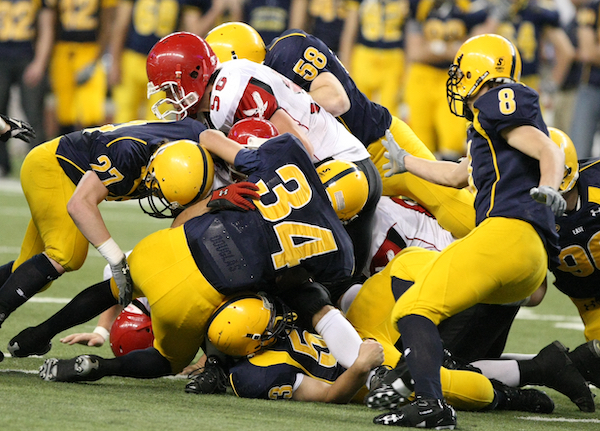 The five straight championships were part of an amazing era that Stuursma and his players say has not diminished with time. They recall no single factor explained going 67-3 overall over those five seasons. There was talent, obviously, but coaching, tradition, confidence and strength of community all played vital parts. There were Thanksgiving practices attended by hundreds of former football alumni, dedicated fan support that included playing before more than 30,000 fans at least twice at Ford Field, and a program-wide attitude that, while some may call it a cliché, proved that success did indeed breed success.
The five straight championships were part of an amazing era that Stuursma and his players say has not diminished with time. They recall no single factor explained going 67-3 overall over those five seasons. There was talent, obviously, but coaching, tradition, confidence and strength of community all played vital parts. There were Thanksgiving practices attended by hundreds of former football alumni, dedicated fan support that included playing before more than 30,000 fans at least twice at Ford Field, and a program-wide attitude that, while some may call it a cliché, proved that success did indeed breed success.
"I'm in awe of the scope of things," said Stuursma, whose team used back-to-back Division 3 championships in 2002-03 as a springboard to later success. "Because we had won a couple times before it just started to feel normal. We had such support the community used to think Thanksgiving break ended at Ford Field."
EGR teams would find all kinds of ways to win during the five-year title stretch. The 2009 team, for instance, barreled through its first four playoff opponents by a combined score of 164-29 until a 24-21 win over Orchard Lake St. Mary’s in the Final. The 2010 team had to win three playoff games by eight points or fewer to finish off its perfect 14-0 record. And then there was the wild 46-39 five-overtime win over St. Mary's in the 2007 Final during which the Pioneers had to score on all five possessions in overtime to outlast the Eaglets.
While teams always seemed to find ways to get the victory, former players remember what it was like to be part of a seemingly endless tradition of success on the football field.
"One of the things that was so special about East Grand Rapids were the expectations," said Luke Glendening, a running back on the 2006 team who has gone on to a long NHL career with the Detroit Red Wings and Dallas Stars. "During the game I'd look around and see guys who had played here a long time ago. I viewed it as a privilege to have the opportunity to play before the alumni and community."
Quarterback Ryan Elble, who completed a combined 34 passes for 483 yards and seven touchdowns during the 2008 and 2009 Finals, also used the word "honored" to describe his high school experience.
"The culture was to win. Coach Stuursma made it fun, and it always seemed to take shape on the field," said Elble, who went on to play baseball at Miami (Ohio) "I think each team had different skill sets, but at the end of the day it was our culture and putting in the work to spend Thanksgiving weekend at Ford Field."
The players point to that winning culture over talent. Elble said he played with only one eventual Division I college player in linebacker/running back Trent Voss, who went on to Toledo. Nobody wins without talent, of course, but they point to many other factors as being just as critical. Because EGR coaches would always work juniors into the lineup, Stuursma said the program faced only one major rebuild, in 2007. That team wound up 13-1 and the second of those five straight champions.
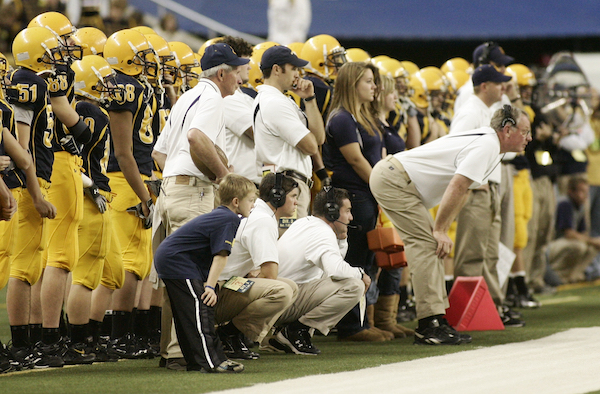 "We had some incredible players," said Stuursma, who left EGR in 2016 to lead Hope College to two Michigan Intercollegiate Athletic Association titles, three second-place finishes and a 46-15 overall record over his seven seasons. "We returned only two starters (in 2007), but we still had good guys who wanted to win."
"We had some incredible players," said Stuursma, who left EGR in 2016 to lead Hope College to two Michigan Intercollegiate Athletic Association titles, three second-place finishes and a 46-15 overall record over his seven seasons. "We returned only two starters (in 2007), but we still had good guys who wanted to win."
The players say the culture started with Barcheski and the program's tradition. As Hope College's coach, Stuursma said there’s a similar common thread among schools he sees on recruiting visits: a winning tradition that, in Stuursma's words "screams excellence," from every corner of the building. He sees it the minute he walks into some schools, and East Grand Rapids had the same culture before he arrived. The past players say it played a major part in their careers.
That tradition didn't start with the five straight titles, said former quarterback Kyle Cunningham, who played on the 2002-03 teams and went 46-0 over four years from his freshman to senior seasons. Those two championship teams’ most recognizable player was running back Kevin Grady, who still holds multiple MHSAA records including for career rush yardage and went on to play at University of Michigan.
"We worked hard and had a lot of pride," he said. "I remember watching film of earlier teams, and I remember hoping our team could stand up the same way."
While the players point to tradition and community, Ryan Blair, a tight end/defensive tackle on the 2006-08 champion clubs, said talent remained critical – but EGR was outmanned physically in some of those title games. That's when camaraderie and the confidence that someone was going to make a key play took over. The Pioneers' remarkable run was teeming with such plays.
"Certainly we were never one of the biggest teams there, we never had a big size advantage in any game," he said. "But we had this camaraderie on every team. We had guys who really liked playing with each other. When things got tight we stuck together, and we'd fight to the fourth quarter or beyond."
Despite the long odds of winning a single state title let alone repeating, Stuursma believes there could be a team one day which wins six straight. That team will have the same characteristics of those EGR teams – the talent, coaching, tradition and fortune of catching timely breaks – but it can be done, he said.
"Absolutely," Stuursma said. "The only record I can think of that won't be broken is Wayne Gretzky's (NHL) scoring record. It will take a lot, but records are made to be broken. I think high school football is on the upswing and there would have to be an emphasis on winning. You would have to have a good path to get there, but I can see someone getting six one day."
PHOTOS (Top) East Grand Rapids celebrates its third-straight Division 3 championship win in 2008. (Middle) Pioneers converge on an Orchard Lake St. Mary’s ball carrier during the 2007 five-overtime title decider. (Below) EGR coach Peter Stuursma, kneeling center, monitors the action during the 2010 championship game.

